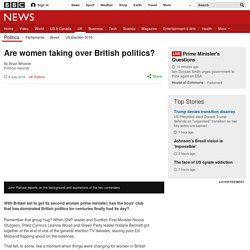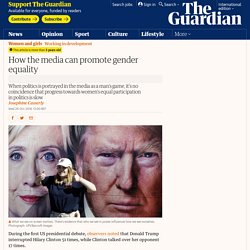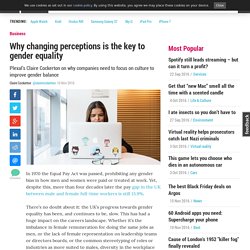

Are women taking over British politics? - BBC News. With Britain set to get its second woman prime minister, has the boys' club that has dominated British politics for centuries finally had its day?

Remember that group hug? When SNP leader and Scottish First Minister Nicola Sturgeon, Plaid Cymru's Leanne Wood and Green Party leader Natalie Bennett got together at the end of one of the general election TV debates, leaving poor Ed Miliband flapping about on the sidelines. That felt, to some, like a moment when things were changing for women in British politics. The impressive performance of female politicians, such as Andrea Leadsom and Scottish Tory leader Ruth Davidson in the EU referendum TV debates, felt like another. Now, with Mrs Leadsom and Theresa May battling it out for the Tory leadership we are on the verge of getting our second female prime minister, 26 years after Margaret Thatcher left Downing Street. Image copyright Reuters But have things really changed for women in British politics - or is it all just a historical accident? Young women 'highest mental health risk' as 'selfie' culture heaps pressure. What a Donald Trump presidency means for women and girls.
"Nobody has more respect for women than I do," Donald Trump told voters at the first presidential debate.

With a Trump presidency on the cards, women and girls should brace themselves for his next four years in the White House. With a Republican-led senate and house, the real estate mogul turned president has what some have described as a blank cheque to push his policies through the Oval Office. The biggest threat is to Roe V Wade, a 1973 law which guarantees women the right to an abortion in all 50 states. The threat comes in the form of who he appoints as the next supreme court justice, filling in the spot left vacant by the late Antonin Scalia. If Mr Trump appoints a second justice - three of the judges are aged 78 and older - that could lead to a conservative majority of justices, and a reversal of a decades-old law. Although he has avoided the question of Roe V Wade directly thus far, he has made his pro-life stance clear. Play Video Close This is a modal window. Reuse content. Global Development Professionals Network.
During the first US presidential debate, observers noted that Donald Trump interrupted Hilary Clinton 51 times, while Clinton talked over her opponent 17 times.

For many commentators, the gender dynamics within these televised debates have been impossible to ignore. They have magnified the gendered nature of political debate globally. In countries around the world, “masculine” qualities of strength and aggression are valued. And women are interrupted. News media and political programming everywhere all too often feature men talking to men about men. What we see on-screen matters for what happens off-screen. For development practitioners working on women’s empowerment, no matter where it is in the world media is ignored at our peril.
The women fighting back against unequal pay. Normally when we think of unequal pay it is in relation to a man and woman doing the same job for a different wage.

But it can also be about how we value the work women traditionally do. Care workers, cashiers, and cleaners are often among some of the lowest paid people in the country. The feminist groups disrupting bro-tech culture in 2016. Why has the narrative of computer history come to be defined more by images of Bill Gates and Mark Zuckerberg than by the pioneering work of Ada Lovelace, who is often recognized as the world’s first computer programmer?

This question and many others are increasingly being asked by women all across the spectrum of the tech world: from cyberfeminists and hackers who are deeply critical of Silicon Valley and the exploitative nature of the everyday corporate Internet platforms, to women working within the big-tech status-quo who have experienced harassment or who notice gender inequality all around them. Before the 1980s, the number of women studying computer science was actually equal to or higher than the number of men. But beginning in the 80s, that number drastically declined.
“The male domination is so strong because 85% of the Western world thinks Facebook is the internet and they trust corporations more than each other” – Addie Wagenknecht, Deep Lab. Why changing perceptions is the key to gender equality. In 1970 the Equal Pay Act was passed, prohibiting any gender bias in how men and women were paid or treated at work.

Yet, despite this, more than four decades later the pay gap in the UK between male and female full-time workers is still 13.9%. There’s no doubt about it: the UK’s progress towards gender equality has been, and continues to be, slow. #FreeTheNipple controversy hits Durban. Durban - A Durban woman who was snapped at a popular nightclub in an outfit that bared her breasts has stirred up a heated debate on social media - with some critical of her but others hailing her as an ambassador of the “free the nipple” movement.

The movement is named after the 2014 movie by Lina Esco, who also founded the movement. It has resulted in protests in several countries including America, the UK and Iceland where the call is growing for nipples to be treated equally for men and women. Andiswa Luthuli, who declined to give her age, has now brought the debate home through her attire, which also speaks to a growing international feminist movement to “free the nipple”. Luthuli was photographed on Monday at a township club wearing a see-through top which shows her breasts.